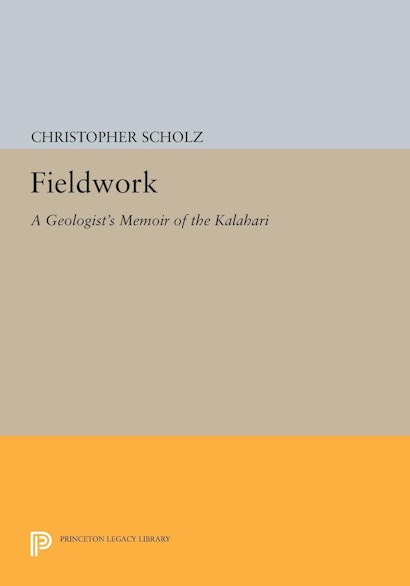Christopher Scholz, an internationally recognized expert in the geological fields of seismology and tectonics, here offers a captivating memoir of a three-month-long field expedition to northern Botswana. Fieldwork tracks the adventures of a group of American scientists trying to gather critical data in some of the wildest and most inhospitable parts of Africa. Scholz effectively captures the unique challenges and obstacles faced in this kind of scientific endeavor, including mysterious encounters with a primitive bushman tribe and unavoidable dealings with belligerent local officials and even near-fatal stampedes by rampaging elephants. It is through this absorbing tale that Scholz offers a paean to the long and unique traditions of geological fieldwork, and provides readers with an inside view of the trials and joys of scientific fieldwork.
The goal of the Scholz expedition was to determine, by recording tiny natural earthquakes, if a previously unknown arm of the East African Rift system had propagated into the Kalahari Desert from the north. Fieldwork tracks the quest of the scientist for a solution to a specific geological problem from the motivations of the scientist, to the initial formulation of the problem, through to the data collection, and finally, the assembly of the critical evidence.
Originally published in 1997.
The Princeton Legacy Library uses the latest print-on-demand technology to again make available previously out-of-print books from the distinguished backlist of Princeton University Press. These editions preserve the original texts of these important books while presenting them in durable paperback and hardcover editions. The goal of the Princeton Legacy Library is to vastly increase access to the rich scholarly heritage found in the thousands of books published by Princeton University Press since its founding in 1905.
"Fieldwork tells a truly engrossing story. It is a great yarn. . . . told with an eye for the interesting detail and a flair for narrative. . . . As Scholz says, 'Some things in life are worth doing solely for the experience.' The same thing could be said about reading this book."—James Trefil, The New York Times Book Review
"Few earth scientists write anything in the style of their life's memoirs, so this book is doubly welcome. It should appeal to a wide variety of readers, whether fieldworkers or not. The science is accessibly laid out and richly embroidered with tales of the bush."—Keith Cox, Nature
"A gripping account of a small research program directed at understanding how continents rift apart.... A thrilling read."—Rob Butler, The New Scientist
"Had Raymond Chandler written of a geologist searching for a 'lost' African rift valley, [Fieldwork] might have been the result. . . . I read it at one sitting, with an image of the late Robert Mitchum as he might have been in the film version. . . ."—Anthony Sinclair, Antiquity
"[T]his book is doubly welcome. It should appeal to a wide variety of readers, whether fieldworkers or not. The science is accessibly laid out and richly embroidered with tales of the bush. . . . Although much of the book is devoted to the sheer joy of life in the bush (and its perils), and is written so that you can almost smell the smoke of the campfire, the descriptions of occasional trips to town are just as evocative of Africa. We meet a rich array of ramshackle bars with ramshackle customers, we play plenty of darts and hear many a comic or curious yarn."—Nature
"A refreshing and easy description of science at the blunter end. . . . You can feel [Scholz's] quiet thrill as he stands on a hillock which, he thinks, lies above the very tip of a continental rift creeping through Botswana."—The Economist
"Fieldwork is delightful. Like Bill Menard's The Ocean of Truth, this book gives an account of how earth science works. However, it also has a story to tell. Often the logistical problems behind a scientific expedition are as captivating as the science itself. Christopher Scholz's primary objective is to spell out the logistical planning and execution that is required to make a scientific discovery."—Terry Engelder, Pennsylvania State University
"In Fieldwork, we learn about aspects of science and about the motivation of a scientist as well as about the problems facing a country emerging from a colonial past. The book makes a bridge between various kinds of human endeavors. It's very well-written, very readable, and hard to put down."—Alfred G. Fischer, University of Southern California

